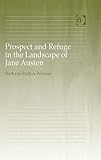 Barbara Britton Wenner analyses Austen’s use of nature in her novels and Juvenilia. Nature and culture, female and male, and submissive and oppressive elements are juxtaposed in order to show how the heroines’ relation to nature enhances their experience and gradual self-recognition.
Barbara Britton Wenner analyses Austen’s use of nature in her novels and Juvenilia. Nature and culture, female and male, and submissive and oppressive elements are juxtaposed in order to show how the heroines’ relation to nature enhances their experience and gradual self-recognition.
Thankfully the author doesn’t attempt to prove that Austen had one and only proper model either of nature, picturesque or estate, but rather moves above the usual discourse, demonstrating instead how freely and confidently Austen used the late 18th century concepts of landscape in order to show danger or refuge, and desirable or dreaded situations and characters. It’ll help you to better understand both the idea of picturesque and Austen’s novels.
The book is expensive, but likely available from your library. However, if you can afford it, it’s well worth having. Check it either at Amazon UK or Amazon US.
Highly recommended!






 Austen chose Easter for the most significant turn in Pride and Prejudice.
Austen chose Easter for the most significant turn in Pride and Prejudice. When talking of love it is important to define the word. Is it emotion, feeling, decision or all of the elements? According to some Christians i.e. Anglicans and Catholics four kinds of love must be present for the Holy Matrimony to be valid and complete. I’ll try to explain, on their example, Elizabeth’s growing love for Darcy in Pride and Prejudice.
When talking of love it is important to define the word. Is it emotion, feeling, decision or all of the elements? According to some Christians i.e. Anglicans and Catholics four kinds of love must be present for the Holy Matrimony to be valid and complete. I’ll try to explain, on their example, Elizabeth’s growing love for Darcy in Pride and Prejudice. There is a lot of confusion as to when and why Elizabeth Bennet fell in love.
There is a lot of confusion as to when and why Elizabeth Bennet fell in love. 

 I uploaded Daniel Defoe’s short essay on
I uploaded Daniel Defoe’s short essay on